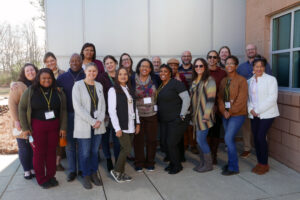
Whole Community Connection (WCC) awarded two Robeson County community-academic partnerships in 2022. In its second year, WCC expanded to support two Edgecombe County community-academic partnerships and two Robeson County community-academic partnerships.
2022 Champions:
Reducing Sexual Violence and Increasing Sexual Health Equity in the Intellectual/ Developmental Disability Community in Robeson County: Increases capacity to provide preventive education, equitable sexual health care, and greater awareness of the need for continued efforts to address the epidemic of sexual violence in the I/DD community across the state of North Carolina.
- Virginia Locklear, Rape Crisis Center of Robeson County
- Amy Perry, Autism Society of North Carolina
- Margaret DeRamus, UNC School of Medicine, Carolina Institute for Developmental Disabilities
- Morgan Parlier, UNC School of Medicine, Carolina Institute for Developmental Disabilities
Supporting Child Mental Health in the Robeson Lumbee Community: Links parent priorities, baseline data and partnerships for action to support child mental health early in life and prevent the adult health challenges documented in Robeson county.
- Trisha Lynn Carter, CareNet Wake Forest Baptist Health Counseling Centers
- Joseph Tyron Bell, Children's Health Pembroke
- Kathleen C. Thomas, UNC Eshelman School of Pharmacy
- Bharathi Jayanthi Zvara, UNC Gillings School of Global Public Health
2023 Champions:
HOPE Alternative Learning Program THRIVE: Focuses on making improvements within the social determinants of health domains of education and health and wellbeing, as well as health care access and quality through on-site school behavioral health services.
- Na'im Akbar, Rural Opportunity Institute
- Tatyana Weathersbe, Rural Opportunity Institute
- Andrew Bradford, UNC Researcher at School of Nursing
- Stacy Rosser, UNC Researcher at Gillings School of Global Public Health
Tarboro / Edgecombe Community Demonstration Garden: Aims to create a sustainable and equitable community garden in the Tarboro area for the physical and mental health benefits of the surrounding community.
- Aerhealle Chace, Freedom Organization
- Loretta Hilliard Draughn, ImpactOne Inc
- Molly De Marco, UNC Professor of Nutrition
- Danielle Purifoy, UNC Assistant Professor of Geography
Robeson Whole Together: Focuses on rural maternal health and wellbeing and aims to identify, adapt and develop community informed interventions to reduce maternal and child health inequities related to rural maternal mental health disparities.
- Erica Little, Healthy Start Robeson at UNC Pembroke
- April Oxendine, Robeson County Department of Public Health
- Sarah E. (Betsy) Bledsoe, UNC School of Social Work
- Anna Fetter, UNC Department of Psychology and Neuroscience
Robeson Parent 2 Parent Project: Seeks to increase the capacity of parents of young children living in Robeson County through peer-to-peer support, evidence-based training, and developing a stronger parenting network for parents of children with disabilities and special healthcare needs within the county.
- Rhonda Dial, CDSA of the Cape Fear
- Tina Ivins, Family Support Network of Southeastern NC
- Selina Armstrong, UNC School of Social Work
- Laurel Powell, UNC School of Social Work
"I am inspired by these strong community-academic partnerships and leaders improving community health in meaningful ways in Edgecombe and Robeson County," said Giselle Corbie, MD, MSc, vice provost for faculty affairs and director of UNC Rural and the Center for Health Equity Research. "I look forward to the year ahead full of rich learning and growing together grounded in health equity, local vision, and social justice."
WCC is a leadership program including grant funding through UNC Rural led by Corbie and the Office of Interprofessional Education and Practice (IPEP) led by Meg Zomorodi, PhD, RN, associate provost for interprofessional health initiatives.
"WCC has been intentionally designed by an advisory board of community partners and leaders at UNC," Zomorodi said. "The program is unique in that it brings together community members, faculty, and students to collaborate and learn from, with, and about each other to advance health."
Teams consist of collaborators from existing partnerships including community members from Edgecombe or Robeson County and UNC-CH faculty or researchers. The awarded teams participate in one year of leadership development focused on building relationships for collective and community-led action. In addition, teams receive $45,000 in funding to support their projects to improve community health.
"Through Whole Community Connection, I learned that strong relationships are the foundation of effective community partnerships," said Morgan Parlier, clinical social work faculty at the Carolina Institute for Developmental Disabilities. "We all have something to teach and we all have something to learn."
Veronica Kay Freeman of the Coharie / Waccamaw Siouan Tribe and transfer coordinator at Robeson Community College is one of the program's community advisors.
"I am thankful for WCC because I've been exposed to the concept of Relational Leadership," Freeman said. "What I have found is that this style of leadership is the most natural choice for me as a community advocate and aspiring leader. It includes the holistic team approach to leading and the idea that the value of leadership is derived from the value of its common members.
Whole Community Connection is supported by the William R. Kenan, Jr. Charitable Trust in alignment with the strategic plan for the University, Carolina Next: Innovations for Public Good. WCC supports community and academic leaders to advance health equity in rural North Carolina by increasing local power to focus on priorities by and at the community level and co-creating a model of relationship centered engagement.
Visit wcc.unc.edu to learn more about WCC and how to apply for future cohorts.






